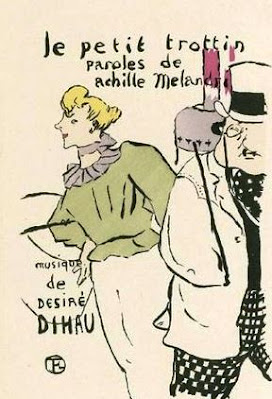 |
Guy de Maupassant
1850 - 1893
|
An officer but not a gentleman.
There’s a story by de Maupassant, typical of him in that it is not a story but an anecdote, with too obvious a point: “The Noncommissioned Officer.” The feckless officer has decided to spend his leave in a small, backwater town with his sister and her husband though they are his opposites, proper, pious, and provincial. The officer is, if not a man of the world, worldly — hard-charging, hard-drinking, and randy, one of those men “for whom life has no greater pleasures than those of the café and public women.” These do not come free: he has decided to visit his sister because there is no one else of his family and acquaintance he has not borrowed from. So perhaps she and her husband, a local official, will . . . .
But he discovers what he should have known all along had he any insight: all he will receive for his “troubles” are a week’s worth of prim lectures and bad meals. The meals he must eat, but the lectures he will ignore because he is a lout. He is, de Maupassant informs the reader, in the phrase the whole story is worth reading for: “Boasting, blustering, full of disdain for everybody, he despised the whole universe from the height of his ignorance.”
The story ends predictably when the officer, having drunken his fill at a local café, and, looking for other satisfactions (his other satisfaction), misunderstands the barman’s directions and stumbles into the house of his brother-in-law’s patron, there mistaking the patron’s wife for a madame and his daughters for whores. His poor brother-in-law is mortified! Har-de-har-har-har. The officer falls on the floor laughing. But what is so funny?
I think, “I’ll ask Uncle Albert.”
He's asleep in front of the France-Poland match; or, he’s asleep at the half. He has turned off the sound because he finds the Fox commentary team’s analysis simultaneously vapid and irritating. (Before he goes to bed, he’ll catch up with James Richard’s “The Totally Football Show.”
I nudge him. “What? Go away. What?”
“de Maupassant. I have a question.”
Again, “What?”
“About a story: ‘The Noncommisioned Officer’ in English.”
“I don’t know it.”
“The main character’s name is Varajou.”
“Varajou,” he corrects my pronunciation.
“Maybe. I don’t know, however, if I can find it.” He pulls his right talon from underneath his throw, painted with penguins, and points at his brain.
“Come on,” I say.
“Likely it is in there,” Uncle Albert says, “but the index . . . .” He stops.
“Can you read what I’ve written?” I’ve printed it out.
He waves his hand. I put the copy in it.
“Vaguely,” he says, waving the paper but referring, I take it, to his memory of the story.
“So?”
“So, what?”
“My question,” I say: “What’s so funny?”
“Ruin,” Uncle Albert says and waves the page toward me until I take it back from him.
“Ruin?”
“Yes. Ruin and recompense.”
“That’s it? Meaning?”
“Think about it.”
12.04.22
to be continued*
_______________
* TA returns on a once-a-week schedule. Mondays. Sometimes Tuesdays. Maybe.







